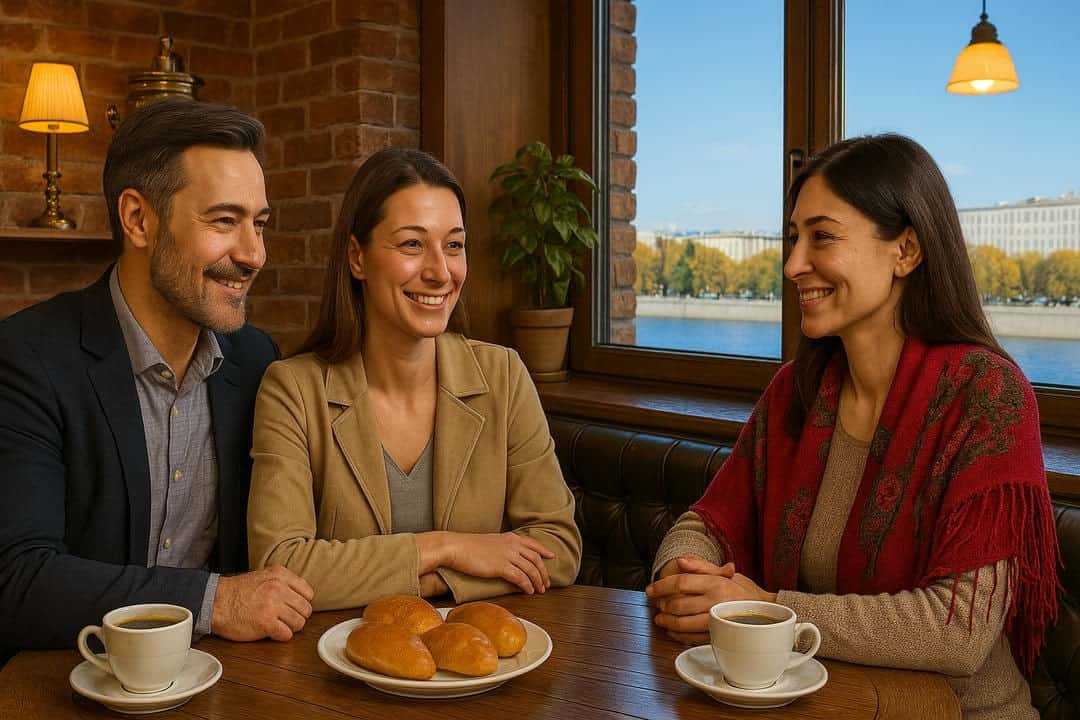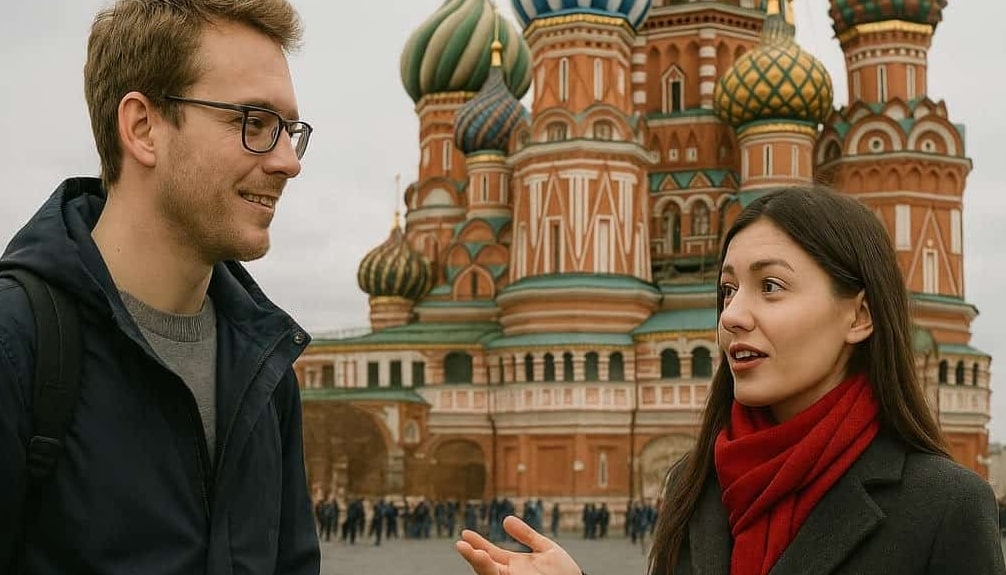Adapting to Russian culture presents a distinctive blend of challenges and opportunities for expatriates. Russia’s rich history, deeply rooted traditions, and specific social etiquette differ significantly from many Western norms, making cultural awareness not just beneficial but essential for successful integration. Understanding the subtleties of communication styles, social expectations, and the historical context that shapes contemporary attitudes can greatly facilitate this process. Yet, the subtleties of building trust and maneuvering everyday interactions often require more than surface knowledge. Exploring these dynamics reveals how an expat’s experience can transform beyond initial impressions.
Introduction
Adapting to a new culture is rarely straightforward, and Russia is no exception. For expatriates, gaining insight into Russian customs and social norms is crucial to minimize misunderstandings and to foster smoother integration. The Russian cultural landscape is shaped by centuries of history, literature, religion, and social change, which influence everyday behaviors and attitudes toward foreigners.
Immersing oneself in Russian culture encourages genuine connections, which can help overcome the common language barriers many expats face. While Russian is a complex language with nuanced grammar and pronunciation, engaging sincerely with locals often opens doors that language alone cannot. Social adaptability—demonstrated through respect for traditions such as hospitality rituals, holiday observances, or appropriate body language—enables newcomers to navigate local customs with confidence and avoid unintended offense.
Although expatriate communities in major Russian cities like Moscow and St. Petersburg offer crucial support networks—providing practical advice and emotional encouragement—actively engaging with native Russians enriches the experience further. It fosters a sense of freedom through authentic interaction and helps expats move beyond insular social circles.
By embracing these components—cultural immersion, social adaptability, community support, and authentic engagement—expatriates equip themselves not only to coexist but to thrive in Russia’s multifaceted cultural environment. Balancing openness with sensitivity to new social contexts creates a foundation for long-term success and personal growth.
Importance of Cultural Awareness for a Successful Experience in Russia
Cultural awareness is an indispensable tool for anyone seeking to live and work effectively in Russia. The country’s social fabric is woven from complex traditions, historical influences, and regional variations that shape everyday life and interpersonal relations.
One key aspect is understanding Russian communication styles. Unlike some Western cultures where casual small talk is common, Russians may appear more reserved initially, valuing sincerity and depth over superficial chit-chat. Directness in speech is often appreciated, but it is balanced by a strong sense of politeness expressed through formal address (using patronymics) and gestures like offering tea or gifts during visits.
Social etiquette also plays a vital role. For example, punctuality is expected in professional settings but can be more flexible in social gatherings. Respecting customs related to greetings (such as firm handshakes among men or waiting for women to initiate a cheek kiss) signals cultural competence. Additionally, Russians place high importance on hospitality; refusing offered food or drink may be seen as rude unless done politely.
Historical awareness adds another layer of understanding. Events such as the Soviet era, World War II (known locally as the Great Patriotic War), and the country’s Orthodox Christian heritage influence national identity and social attitudes. Recognizing these factors helps expatriates interpret behaviors and conversations more accurately.
Leveraging support from the established expat community offers practical benefits. These networks provide insights on housing, legal matters, language learning resources, and cultural tips tailored to foreigners adjusting to Russian life. They also offer emotional support during inevitable culture shock phases.
Finally, developing intercultural communication skills—such as active listening, empathy, and patience—enables expats to build genuine relationships with locals. This approach improves daily interactions, whether in workplaces, markets, or social events.
In summary, cultivating cultural awareness empowers expatriates not only to navigate Russia’s unique social landscape effectively but also to enrich their personal experience. By respecting local customs, understanding historical context, and engaging openly with the community, expats can create lasting connections and enjoy a rewarding stay in Russia.
Navigating Key Cultural Differences for Expats in Russia
Expats settling into Russian life quickly discover a unique cultural landscape that shapes everyday interactions and social expectations in meaningful ways. Understanding these differences helps smooth the transition and enriches the overall experience.
One of the most notable aspects is Russia’s nuanced social hierarchy, which subtly guides communication and expressions of respect. Recognizing this hierarchy allows expats to engage more thoughtfully and avoid common misunderstandings. For example, Russians often expect formal greetings and polite forms of address in professional or unfamiliar settings, reflecting respect for status and age.
Humor in Russia tends to be marked by irony, dry sarcasm, and a sharp wit, which can initially puzzle newcomers. This style of humor serves as a social bonding tool and a way to navigate life’s challenges with resilience. Appreciating this subtlety can open doors to deeper connections and shared laughter.
Gift-giving holds significant cultural value as well. Thoughtfully chosen presents symbolize respect, gratitude, and the desire to build genuine relationships. Whether visiting a home or attending a business meeting, bringing a modest but meaningful gift is a welcomed gesture that reflects cultural awareness.
Public transportation, a vital part of daily life in most Russian cities, comes with its own unspoken etiquette. Patience and attentiveness are essential as locals navigate crowded spaces with efficiency and quiet understanding. Observing these informal rules helps expats blend seamlessly into routines that may initially feel brisk or intense.
By embracing these cultural nuances, expats not only adapt practically but also enhance their freedom to experience authentic Russian life. This awareness fosters smoother integration without sacrificing individuality or personal authenticity.
Building Interpersonal Relationships: Patience and Cultural Sensitivity
Developing meaningful relationships in Russia requires more than just time—it demands patience, cultural sensitivity, and genuine effort. Unlike cultures that prioritize quick social exchanges, Russian social bonds form gradually and with depth.
Trust is the cornerstone of these relationships. It is cultivated through consistent sincerity, reliability, and respect for local customs. Russians highly value personal connections and often differentiate between casual acquaintances and close friends with care. Expats who invest time in nurturing trust find their social circles growing more rewarding and supportive.
Emotional intelligence plays a crucial role in this process. Being attentive to subtle social cues—such as tone, body language, or conversational pauses—enables expats to respond appropriately and build rapport naturally. For instance, pauses during conversations are not awkward silences but moments of reflection that signal respect and thoughtfulness.
Balancing respect for tradition with personal authenticity is key. Expats who honor local customs while remaining true to themselves tend to foster more meaningful interactions. This approach creates space for genuine friendships that enrich the expat experience and provide a sense of belonging without pressure.
Trust and Time: Foundations for Social and Business Interactions
In Russia, trust underpins both personal and professional relationships. Establishing trust typically requires consistent effort over time rather than quick wins. This cultural value shapes how Russians approach socializing and business dealings alike.
Successful trust-building involves demonstrating sincerity through actions rather than words alone. Reliability, openness, and commitment resonate deeply within Russian culture. Expats who prioritize genuine interactions over superficial networking often find stronger bonds that support both personal growth and career advancement.
Networking within community groups or shared interest circles offers meaningful opportunities to connect beyond formal settings. These interactions foster mutual understanding and cultural exchange that enrich relationships on multiple levels.
Time investment in conversations—whether social or business—is another important factor. Russians generally appreciate a slower pace that allows for thoughtful discussion rather than rushing to conclusions. Conversational pauses are respected as valuable moments for consideration, reflecting an emphasis on depth over speed.
In business contexts, patience can be especially crucial. Negotiations may take longer as trust builds gradually through dialogue and subtle cues of respect. Expats who embrace this rhythm gain greater insight into decision-making processes and lay solid foundations for lasting partnerships.
By aligning with Russia’s social timing and interaction style, expats unlock more meaningful connections. This approach blends efficiency with respect and opens pathways to enriching experiences both personally and professionally.
Understanding Russian Social Norms Around Smiling and Public Behavior
Forming meaningful connections in Russia goes beyond conversational pace to include a deep awareness of social cues, particularly facial expressions and public conduct. These subtle behaviors carry important cultural meanings that shape daily interactions.
The Unique Role of Smiling in Russian Culture
In Russia, smiling differs significantly from Western expectations. Unlike cultures where frequent smiling is a default sign of friendliness, Russians often present a more reserved exterior. This restraint reflects a cultural preference for sincerity and authenticity over what may be perceived as superficial cheerfulness.
Russians tend to smile selectively—typically among close friends or family—where emotional expressions are genuine and meaningful. For expats accustomed to constant warmth, this can feel unfamiliar or even cold at first. However, understanding this norm is crucial: a neutral or serious facial expression in public is not a sign of unfriendliness but a demonstration of respect for social boundaries.
Why Russians Rarely Smile at Strangers
Smiling at strangers in Russia is uncommon and carries different social implications compared to many other cultures. Here, emotional gestures like smiling are reserved for genuine personal connections rather than casual encounters.
Smiling without a clear reason can be interpreted as insincere or intrusive. This norm helps maintain clear boundaries in public spaces and preserves privacy, which Russians highly value. Recognizing this helps expats avoid misreading expressions as hostility or coldness.
By adapting to this expectation, expats gain freedom to engage authentically within Russian society without feeling pressured to imitate foreign behavioral standards. This respect for emotional restraint is a distinctive cultural trait that shapes public demeanor.
Interpreting Reserved Social Behavior Without Offense
The restrained approach to smiling is part of a wider pattern of reserved social behavior in Russia. This can be challenging for newcomers who might interpret such reserve as disinterest or aloofness.
In reality, reserved expressions often signal thoughtfulness and composure rather than emotional distance or rudeness. Russians tend to communicate through subtle, nonverbal cues that require careful attention and cultural sensitivity.
Emotional distance in public is not personal—it is a cultural norm designed to protect privacy and maintain respectful interactions. For expats, cultivating patience and openness toward these behaviors prevents misunderstandings and builds mutual respect.
Practical Insights for Expats
- Don’t take a lack of smiling personally: A neutral expression often means respect.
- Observe others’ cues: Pay attention to tone, eye contact, and body language.
- Adapt your own behavior: Balance warmth with cultural norms, avoiding overly familiar gestures in public.
- Value sincerity over surface friendliness: Genuine relationships develop gradually through trust and authentic interaction.
By embracing these social norms around smiling and public behavior, expats can navigate Russian society with greater ease and build deeper, more genuine connections. This understanding enriches the experience of living in Russia while honoring the country’s distinctive cultural identity.
Learning Russian History and Cultural Background
To truly understand Russian culture, it is essential to appreciate the rich historical tapestry that has shaped its values, traditions, and social norms. This background provides valuable context for expats seeking to engage respectfully and confidently within Russian society.
Russia’s history is marked by significant events that have left a lasting impact on the national mindset. From centuries of tsarist rule through the complex Soviet era, these periods have influenced attitudes toward authority, community, and resilience.
This historical legacy fosters a cultural balance between respect for strong leadership and a deep communal spirit. Russians often value endurance and collective strength, traits developed through enduring hardships and societal transformations. Understanding these layered influences helps expats make sense of social behaviors, expectations, and the ways Russians navigate trust and change.
Exploring Russian Literature and Art
Russian literature offers profound insights into themes of identity, freedom, and the human spirit. Works by authors such as Tolstoy, Dostoevsky, and Chekhov delve into philosophical questions that continue to resonate in modern society. For expats, engaging with this literature reveals cultural values and emotional depth that enrich daily interactions.
Similarly, Russia’s influential art movements—from classical to avant-garde—reflect aesthetic sensibilities deeply woven into everyday life. Appreciating these artistic traditions helps expats connect more intimately with local culture and history.
Political History Without Judgment
While political history is intertwined with cultural development, understanding it objectively allows expats to gain clarity on societal structures without imposing personal judgments. Recognizing how past governance shapes current social dynamics encourages empathy and informed interaction.
Reducing Culture Shock Through Knowledge
Adapting to a new culture can initially feel overwhelming. However, acquiring practical knowledge about Russian customs, communication styles, and social expectations eases this transition considerably.
Effective strategies include:
- Observation: Learning through watching local interactions helps grasp unspoken norms.
- Engagement: Building relationships with locals offers firsthand cultural insights.
- Resources: Reading books, attending workshops, or participating in online forums provides deeper understanding.
This informed approach empowers expats to navigate everyday life with confidence, reducing uncertainty and promoting personal freedom within a new environment.
Practical Benefits of Historical and Cultural Awareness
- Enhances respectful engagement by appreciating cultural values rooted in history.
- Clarifies social behaviors influenced by collective experiences.
- Supports authentic connections by understanding deeper cultural motivations.
- Transforms initial challenges into enriching experiences rather than obstacles.
Thoughtful engagement with Russian history and culture provides expats with the tools needed for meaningful integration while respecting their own identity and desire for freedom. This foundation creates a rewarding experience that moves beyond surface-level adaptation toward genuine cultural appreciation.
Respecting Social Etiquette and Manners in Russia

Awareness of social etiquette and manners is key to navigating daily interactions in Russia. Traditional customs hold strong influence, especially in social gatherings where punctuality and formal greetings are important.
Family dynamics emphasize respect for elders, reflecting deeply rooted cultural values. On public transportation, offering seats to seniors or pregnant women is a common practice that demonstrates consideration.
Gift etiquette is significant: modest, thoughtful presents foster goodwill, while overly extravagant gifts may cause discomfort. Following these customs allows expats to engage authentically, balancing respect with their own personal freedom.
Hospitality Customs in Russian Homes
Russian hospitality highlights warmth and generosity, creating a welcoming atmosphere for guests. Homes often feature carefully arranged decor that reflects cultural pride.
Hosts typically prepare abundant traditional food and drinks as a sign of respect and care. Guests are encouraged to share stories and participate in cultural rituals, which helps build connection.
Understanding the balance between formal customs and heartfelt welcome enables expats to navigate Russian hospitality smoothly, enriching their experience without feeling constrained by unfamiliar practices.
Table Manners and Gift-Giving Traditions
Dining etiquette is an important part of social interaction in Russia. Formal table settings emphasize respect and attention to detail. Guests should wait for the host’s invitation before beginning to eat and avoid resting elbows on the table.
Common gifts include flowers, sweets, or traditional items like vodka or chocolates, all symbolizing goodwill. Certain foods carry special meanings; for instance, bread and salt represent hospitality.
Adhering to these traditions demonstrates respect for Russian culture and helps expats participate confidently in social occasions.
Business Etiquette and Formal Behavior
Social customs extend into the professional sphere, where business etiquette is highly valued. Formal attire signals professionalism and respect during meetings.
Punctuality and hierarchical seating arrangements reflect status and decorum. Successful networking relies on patience and building genuine trust over time, while negotiations require firmness balanced with politeness.
Business communication favors directness combined with formality, avoiding overly casual language. Understanding these conventions supports smoother professional interactions while maintaining personal authenticity.
Adapting Communication Style
Russian communication often appears direct and sometimes abrupt to outsiders, but adapting to these nuances is essential for effective interaction.
Recognizing preferred humor styles—often dry or sarcastic—helps prevent misunderstandings. Conversation starters typically relate to shared interests or current events, reflecting an appreciation for context.
Observing body language, which may be more reserved or expressive than expected, provides important cues during conversations. Adjusting to these patterns allows expats to engage genuinely while respecting communication norms.
Directness and Straightforwardness in Conversations
Clarity and efficiency are highly valued in Russian communication, resulting in conversations that are direct and straightforward.
Those used to indirect styles may misinterpret bluntness as rudeness. Understanding this directness as honesty rather than offense is important for positive interactions.
Humor can be more sarcastic or dry, and emotional expression might seem restrained but is often intense when genuine. Recognizing these aspects helps expats engage openly without discomfort or misinterpretation.
Managing Expectations About Punctuality and Negotiation Pace
Attitudes toward punctuality in Russia can be flexible, with some tolerance for delays reflecting a more fluid approach to time.
Negotiations often proceed deliberately and can take time, emphasizing relationship building rather than quick decisions.
Adapting expectations to these rhythms helps avoid frustration. Patience and persistence are valued qualities that contribute to trust and smoother exchanges.
This approach balances respect for local customs with personal autonomy in both social and professional settings.
Non-Verbal Communication Tips
Non-verbal cues carry strong meaning in Russian interactions. A firm handshake and upright posture convey confidence.
Facial expressions are often subtle; stoicism may mask true feelings, so small changes are significant. Personal space tends to be closer than in many Western cultures, signaling trust and warmth.
Gestures vary—thumbs-up is positive, but pointing can be seen as rude. Maintaining steady eye contact reflects sincerity and engagement.
Understanding these cues helps expats connect authentically while respecting cultural norms.
Dealing with Curiosity and Attention
Expats frequently attract curiosity from locals, which reflects interest rather than intrusion.
Managing this curiosity involves recognizing opportunities for genuine interaction while setting personal boundaries as needed.
Awareness of cultural perceptions allows expats to handle attention gracefully, maintaining comfort without closing off social possibilities.
Balancing openness with discretion fosters respectful exchanges that enrich the expat experience.
Understanding Why Foreigners Attract Stares
Prolonged gazes or stares from locals can feel intrusive but usually stem from natural curiosity about unfamiliar faces rather than any negative intent.
This curiosity reflects cultural dynamics where noticing differences is common. Recognizing this helps expats interpret such attention without discomfort.
Awareness of this context builds confidence in navigating social situations while preserving a sense of personal freedom.
Responding Positively to Curiosity
Transforming moments of curiosity into positive cultural exchange involves responding openly yet thoughtfully when approached.
Welcoming questions with calm honesty builds trust and breaks down barriers, turning potential discomfort into meaningful dialogue.
Viewing curiosity as a chance for connection enables expats to deepen cultural understanding while maintaining respect for personal boundaries.
This approach enriches the experience of living in Russia and supports genuine community integration.
Language Skills and Cultural Phrases for Integration into Russian Society
Acquiring basic Russian language skills and familiarizing oneself with key cultural phrases significantly eases the integration process into Russian society. Understanding the language is more than just learning vocabulary; it is about connecting with people, showing respect for the culture, and navigating daily life with confidence.
The Importance of Language and Culture in Integration
Language learning resources, such as mobile apps (Duolingo, Memrise), online courses, and local language schools, provide structured approaches to learning Russian. However, combining these with cultural immersion—such as attending local events, watching Russian films, or participating in community activities—deepens your understanding of social norms and customs. This combination facilitates meaningful connections and helps avoid misunderstandings.
Exploring regional dialects and accents also provides valuable insight into Russia’s diverse cultural landscape. For example, the pronunciation and some vocabulary can differ between Moscow, Saint Petersburg, and Siberian regions. Awareness of these nuances enriches communication and shows sensitivity toward local identity.
Practical language tips include paying close attention to context and non-verbal cues like gestures and facial expressions, which are crucial in Russian communication. Russians often rely on tone and body language to convey subtle meanings. Recognizing these cues improves comprehension and demonstrates cultural respect.
Effective communication strategies prioritize clarity, patience, and politeness. Speaking slowly, using simple sentences, and confirming understanding help bridge language barriers. Demonstrating patience encourages positive interactions and builds trust with locals.
Adopting these approaches supports freedom in expression and interaction without putting excessive pressure on achieving fluency right away. The goal is practical communication that respects cultural norms while enabling personal expression.
Basic Russian Phrases to Learn for Everyday Use
Mastering a selection of fundamental Russian phrases lays a practical foundation for expats navigating everyday interactions with confidence and respect.
- Greetings: Polite greetings like “Здравствуйте” (Zdravstvuyte – Hello) and “Доброе утро” (Dobroye utro – Good morning) are essential. Using formal greetings shows respect, especially when addressing strangers or elders.
- Polite Expressions: Words like “Спасибо” (Spasibo – Thank you) and “Пожалуйста” (Pozhaluysta – Please/You’re welcome) help maintain courteous interactions.
- Common Questions: Phrases such as “Где находится…?” (Gde nakhoditsya…? – Where is…?) empower expats to ask for directions confidently. Another useful phrase is “Сколько это стоит?” (Skol’ko eto stoit? – How much does this cost?).
- Everyday Vocabulary: Learning words related to food, transportation, and shopping streamlines routine tasks such as ordering meals (“Я хочу…” – Ya khochu… – I want…) or buying tickets.
- Basic Conversation Starters: Simple questions like “Как дела?” (Kak dela? – How are you?) open friendly dialogue and help build rapport.
This practical linguistic toolkit not only facilitates smooth communication but also honors local customs such as polite formal address (using “вы” instead of “ты” when speaking to unfamiliar people). It fosters a sense of freedom through understanding and mutual respect in Russian culture.
Additional Insights
- Russian uses the Cyrillic alphabet, which may seem challenging at first but learning to read it unlocks access to signs, menus, and written materials.
- Russians value sincerity and directness but also appreciate polite formalities.
- In social settings, addressing someone by their first name plus patronymic (a middle name derived from the father’s first name) is a sign of respect.
- Understanding cultural phrases related to holidays (e.g., “С Новым годом!” – Happy New Year!) can enhance social bonding.
Understanding these linguistic basics alongside cultural awareness can help newcomers navigate Russian society confidently, making daily life more accessible and interactions more rewarding.
Thriving in Russia: Embrace Culture, Build Trust, and Communicate with Confidence
Adapting to life in Russia is a journey that goes far beyond learning the language or following surface customs. It requires genuine cultural awareness, patience, and respect for deeply rooted traditions shaped by history and social values. By understanding the nuances of Russian communication, social etiquette, and interpersonal dynamics, expatriates can transform initial challenges into rewarding experiences.
Building trust takes time and sincerity, whether in friendships or business relationships. Recognizing the unique role of reserved behavior, selective smiling, and direct communication styles helps expats navigate social interactions without misunderstanding or offense. Engaging with local customs—from gift-giving to hospitality—and embracing the rich historical and cultural background enriches daily life and opens doors to authentic connections.
Learning basic Russian phrases and appreciating non-verbal cues further empower expats to communicate effectively while honoring cultural norms. Supported by expat communities yet actively reaching out to native Russians, newcomers create a balanced approach that promotes both personal freedom and meaningful integration.
Ultimately, thriving in Russia means blending curiosity with cultural sensitivity, patience with openness, and respect with genuine engagement. This thoughtful approach not only eases adaptation but also turns living in Russia into a profound opportunity for growth, connection, and fulfillment.







